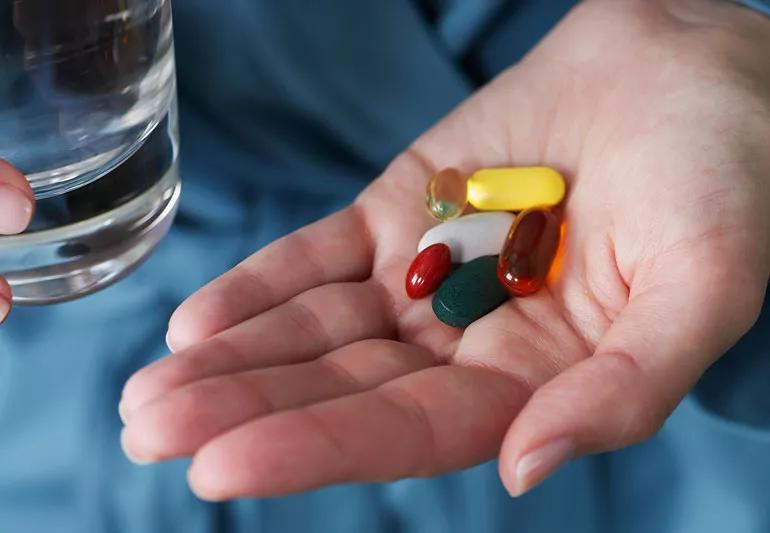Be sure to tell your doc about over-the-counter pills and powders

Image content: This image is available to view online.
View image online (https://assets.clevelandclinic.org/transform/8dd42845-4788-44fa-ac60-a65151c351f4/vitaminsSupplements-85636140_770x533_jpg)
taking vitamins and supplements
A: Long story short, yes! Every time you head to the doctor’s office, it’s the same question: “What medications are you taking?” You may know exactly which prescription medications you take every day — but even the most diligent patient may not realize how important it is to tell your healthcare provider about the over-the-counter medications and supplements you take, too.
Advertisement
Cleveland Clinic is a non-profit academic medical center. Advertising on our site helps support our mission. We do not endorse non-Cleveland Clinic products or services. Policy
If you’re taking multiple medications, your doctor will want to be on the lookout for possible drug interactions. Before writing you a new prescription, your provider will take a look at your chart to see what else you already take — but just as prescription medications can interact with one another, so too can they interact with over-the-counter painkillers and allergy medications, herbal supplements and even your daily vitamins.
Let’s say, for example, that you have an infection, and your doctor puts you on an antibiotic. Calcium and iron supplements can bind to certain antibiotics, making it harder for your body to absorb them — which ultimately makes that medication less impactful on your infection. That’s just one of many examples that drives home why it’s so vital that your doctor knows exactly what you take in order for them to make an informed decision about your care.
I recommend that you keep an updated list of everything you take, whether it’s written on a piece of paper that you keep in your wallet or stored in an app on your phone. That way, when the doctor’s office asks you, “What medications are you taking?” you’ll be able to simply show them the list.
–Family medicine specialist Matthew Goldman, MD
Advertisement
Advertisement

Sign up for our Health Essentials emails for expert guidance on nutrition, fitness, sleep, skin care and more.
Learn more about our editorial process.
Advertisement
There are several vitamins and mineral supplements that many people can benefit from — but it’s important to consult with a healthcare provider before you start one
These essential elements from fats, protein, carbs, vitamins and minerals help your body function properly
Experts are at odds over the effectiveness of multivitamins
Sync your supplements with your schedule for maximum benefits
Do’s and don’ts for supplementing without a stomach ache
The supplement shouldn’t replace a healthy diet, but it can help you get in your fruits and veggies
This edible insect powder can be a good source of protein, fiber and other nutrients
There’s no evidence to prove this supplement can help with weight loss, and it may come with risks
Type 2 diabetes isn’t inevitable with these dietary changes
Applying a hot or cold compress can help with pain
Pump up your iron intake with foods like tuna, tofu and turkey